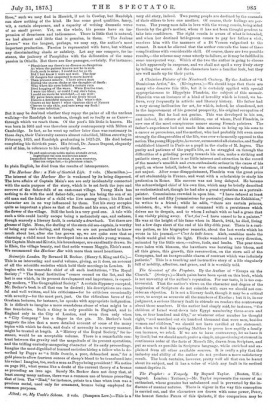Scientific London. By Bernard H. Becker. (Henry S. King and
Co.)— This is an interesting and useful volume, giving, as it does, an account of all the scientific societies which hold their meetings in London. It begins with the venerable chief of all such institutions, "The Royal Society ;" " The Royal Institution " comes second on the list, and the last is one which, in its present development and importance, is especi- ally modern, "The Geographical Society." &certain flippancy excepted, Mr. Becker's book is all that can be desired ; his descriptions are care- ful and well written, and his criticisms—for he criticises occasionally with severity—for the most part, just. On the ridiculous farce of the Gresham lectures, for instance, he speaks with appropriate indignation. It is difficult to imagine a more scandalous abuse of what might be a fine foundation. Such a thing is only possible in England, and in England only in the City of London, and even then only when a "City Company" has a finger in the pie. Mr. Becker's book suggests the idea that a more detailed account of some of the many topics with which he deals, and deals of necessity in a cursory manner, might be treated at length. A "History of the Royal Society," for• in- stance, would be an :acceptable .volume. There is a remarkable con- trast between the gravity and the magnitude of its present operations, and the trifling curiosity-mongering character of its early proceedings. Imagine the most dignified of learned societies hiring a fellow who is de- scribed by Pepys as "a little frantic, a poor, debauched man," for a gold piece to allow fourteen ounces of sheep's blood to be transfused into his veins I Imagine, too, such a man as Pepys being president ! We notice on page 261, what roma like a doubt of the current theory of a bronze as preceding an iron age. Surely Mr. Becker does not deny that, at least among many nations, there was a common use of bronze preceding that of iron. The "Iliad," for instance, points to a time when iron was a precious metal, used only for ornament, bronze being employed for common purposes.






























 Previous page
Previous page